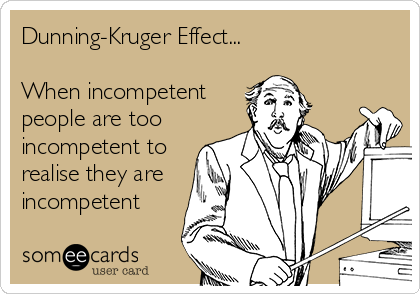This finding was not a quirk of trying to measure subjective sense of humour. The researchers repeated the experiment, only this time with tests of logical reasoning and grammar. These disciplines have defined answers, and in each case they found the same pattern: those people who performed the worst were also the worst in estimating their own aptitude. In all three studies, those whose performance put them in the lowest quarter massively overestimated their own abilities by rating themselves as above average.
Phrased another way:
Other research has shown that this “unskilled and unaware of it” effect holds in real-life situations, not just in abstract laboratory tests. For example, hunters who know the least about firearms also have the most inaccurate view of their firearm knowledge, and doctors with the worst patient-interviewing skills are the least likely to recognise their inadequacies.
So … if you’re inept and you’re not very good at something, you most likely think you’re other-worldly excellent at it. OK. But what if you are actually good at something?
As you might expect, most people thought their ability to tell what was funny was above average. The results were, however, most interesting when split according to how well participants performed. Those slightly above average in their ability to rate jokes were highly accurate in their self-assessment, while those who actually did the best tended to think they were only slightly above average. Participants who were least able to judge what was funny (at least according to the professional comics) were also least able to accurately assess their own ability.
Look at the bold. Those who are good at something = think they’re only slightly above average. Those who are bad = think they’re very good.
Could this explain success in a nutshell?
It might be able to, because think about it: you’re good at something but you think you’re only slightly above-average. So you work harder. That makes you better, and you already were good. Here comes success.
Meanwhile, you’re not very good at something and you think you’re very good. You don’t work as hard. (“I’ve already got that down pat.”) You fall behind others. Ineptitude moves forward. (Insert something about “The Peter Principle” here.)
This is all called the Kruger-Dunning Effect, or the Dunning-Kruger Effect (take yer pick). It essentially says: “Unskilled individuals suffer from illusory superiority, mistakenly assessing their ability to be much higher than is accurate.”
Insert joke about guys and their sexual performance here.
A lot of this whole idea goes back to self-awareness. Very few people have that. People tend to view their lives in the best — or at least most agreeable — possible way they can. (That’s a coping mechanism, after all.) It’s hard to look at situations for what they really are because we’re strongly encouraged not to discuss failure as failure is, and we spend 1/3 of our lives (i.e. work) at a place where honesty is a total black hole. It’s hard.
Kruger-Dunning might be essentially measuring self-awareness (which, again, very few people have), but the bottom line is … If you think you’re a genius at X, Y, or Z activity, it might be best to check yourself on said topic.
